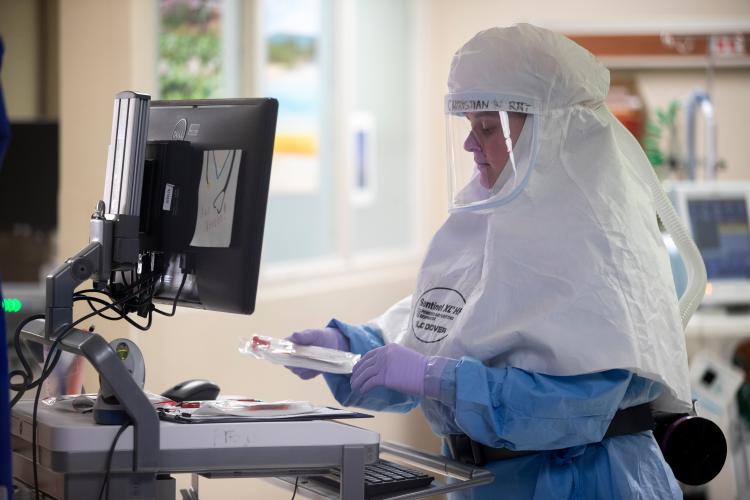
While everyone’s life has been impacted in one way or another by the COVID-19 pandemic, JPS Health Network respiratory therapists find themselves front and center in the battle against a disease that causes those hardest hit to struggle for every breath.
“Our therapists do such an amazing job every day,” said Rob Welborne, Clinical Manager of the Respiratory Therapy Department. “They’ve been called upon to work long hours and handle the intense pressure, day after day, week after week, that COVID’s demanded. I couldn’t be more proud of them.”
Welborne said therapists spend hours a day in the COVID unit, monitoring patients and administering care. They work 12 hour shifts for days on a row, often three or four days on followed by one brief day off, then back to work for three or four more days.
Therapist Juliana Hernandez said, while the hours are still long and the work is just as tough and heartbreaking, things are getting better in terms of what can be done for patients.
“We were very good at the way we cared for respiratory patients before the pandemic,” Hernandez said. “But here comes COVID, and now it’s tough because we’re trying to manage a disease and we really know very little about it.”
Our therapists do such an amazing job every day. They’ve been called upon to work long hours and handle the intense pressure, day after day, week after week, that COVID’s demanded. I couldn’t be more proud of them.
In addition to working long days, therapists had to leave their uncomfortable protective gear on for hours at a time. They never knew when they would be called into a room because of medical emergency, and when that happened they couldn’t afford the precious time it took to don their protective gear before rushing into a room to revive a patient whose heart stopped beating.
Hernandez said strategies and medications to battle COVID have emerged. But there’s no vaccination yet. Still, she said it’s at least encouraging that there are have been some medicines approved and treatment plans developed to give therapists some tools to use in their efforts to assist patients.
As procedures have evolved and equipment has become available, other challenges have arisen. Some team members have become ill with the virus, including one serious enough to miss several weeks of work. Another therapist had to worry from afar as her father became seriously ill with COVID, isolated in a hospital in Lubbock as she worked with patients suffering similar symptoms in Fort Worth.
Irma Torres said both of her parents were infected over the summer and her mother was able to recover quickly. Her father, however, ended up intubated in the Intensive Care Unit of a hospital 270 miles away.
“Because COVID patients have to be isolated, we work really hard at JPS with connecting them with their families, calling them every day to make sure they know what’s going on,” Torres said. “I expected that was going to happen with my dad… But it didn’t. It has really given me an appreciation for how much it means to our patients and our families to give them that personal care.”
Torres said it’s frustrating to hear about people who refuse to wear a mask or who continue to gather at parties or other events.
“My parents live in a small town and didn’t do anything besides go to the grocery store when they had to,” Torres said. “They’re the last people you’d ever think would get it. This disease is definitely something to be taken seriously.”
When things were at their worst for her father, Torres said she found it difficult not to be reminded of her fear and sadness about his condition. But she said, while there is no end to the pandemic in sight, therapists can’t afford to let their guard down. They all have to work together to make sure team members are getting the support they need to give patients the best care possible.
“They offered to take me off of the COVID Unit,” Torres said of her supervisors when her father was at his sickest. “But if I didn’t do it, I knew someone else was going to have to pick up those shifts. Everybody’s working so hard now. That wasn’t fair to them, so I wanted to keep doing my share.”
